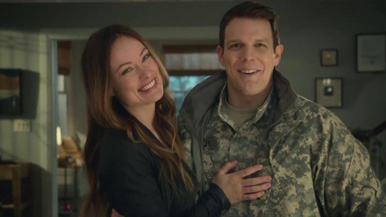Movie Review: Love the Coopers
By Ben Gruchow
November 19, 2015
An ensemble movie like Love the Coopers is made for a very specific type of audience member. The goal is to, in roughly 100 minutes, offer a peek into a world where every personal problem and weakness has a clear and simple root, almost always involves distance from or rejection of family and/or tradition, and is fully addressed in the final 10 minutes by a single heartfelt moment. It offers simplicity and clarity. Whether it does this well is another matter entirely.
We know there will be a driven, independent woman, estranged from the family (Olivia Wilde and Marisa Tomei, in a twofer). There will be a married couple in the middle of a secret falling-out (John Goodman and a digitally-airbrushed maquette impersonating Diane Keaton). There will be a family man (Ed Helms) who fights with his ex-wife (Alex Borstein) over their two shared children. One of those children is growing into a sullen teenager (Timothée Chalamet) and the other just wants Mom and Dad to stop fighting (Maxwell Simkins). We know there will be elderly matriarchs (June Squibb) and patriarchs (Alan Arkin), who are more or less relegated to the background unless a nugget of well-timed wisdom is needed.
I have not yet covered the waitress looking to start over, the police officer who is stoic for personal reasons, or the guy about to ship out overseas. Interestingly, we’re also given a narrator (Steve Martin) who sits somewhat outside of the movie’s immediate universe and yet seems to know all parties intimately. I would not dare reveal the ultimate identity of the narrator, which is given only in the final minutes; I will only note that it seems as if the filmmakers reached the end of their film, realized they’d forgotten to add closure, and hurriedly employed voiceover and second-unit footage to create one.
All of these individuals will come together for isolated bits of comedy and drama, and our job is to watch the personalities off of each other and (hopefully) identify with one or more of them. This, along with the assumption that the filmmakers are doing their job correctly and momentum is building up as the movie progresses, is how we’re to be affected by the revelations/crises/heartfelt moments/all of the above in the final act.
It also provides us with the added benefit of lowered expectations… which is why, in the midst of bland tripe, we can be surprised by a moment that discovers a rhythm between its participants and latches onto it. This happens here in a couple of dialogue scenes set in a rail car, and for just a little bit we get a suspicion that there might be a deeper intelligence at work, and maybe the movie’s just a slow starter. This is also noticed in other, smaller moments, whether it’s a line of dialogue or a striking bit of framing or use of color. And some events are actively absurd: during a scene where a character really, desperately needs to get down a hallway to an elevator fast, the movie throws so many physical obstacles her way that some doves or a walk-on by a sheet of plate glass begins to seem not just possible, but thematically appropriate.
Continued:
1
2
|
|
|
|




